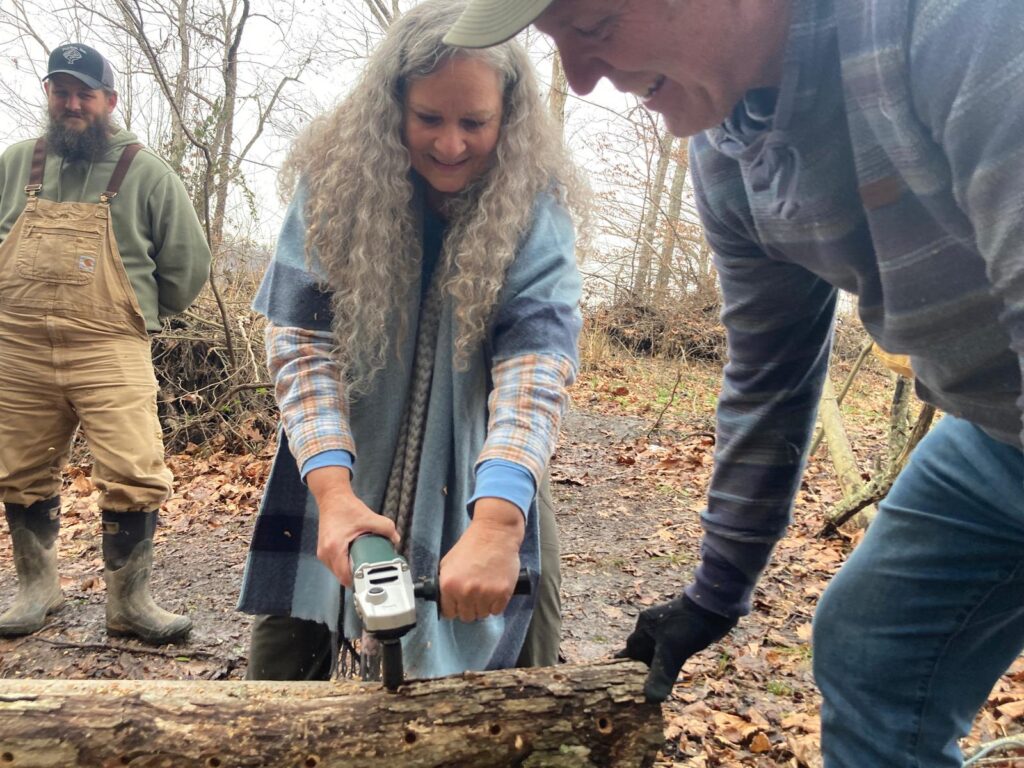Over the past year Regenerative Farms has acted as a convener and supporter for the Future Farm Appalachia (FFA) pilot—helping bring partners, practical training, and resources to Martin and Pike Counties so local entrepreneurs can lead the work of economic and environmental renewal. The pilot was made possible by funding from a USDA Rural Business Development Grant and the relentless local leadership of people like Clifford Smith and Kaleb Hanshaw. Clifford’s land-based vision for a 7,000-acre Future Farm Appalachia hub is the engine of this effort, and the entrepreneurs working with him are the true pioneers—testing how forest-understory crops, mushroom cultivation, silvopasture, and other regenerative enterprises can create livelihoods from reclaimed mine parcels and wooded acres.
This post pulls together what we learned, what we did, and why this work matters—plus links to the webinar series we turned into free, public learning resources.

Why this work matters
Eastern Kentucky carries the long shadow of a once-dominant extractive economy. When Big Coal receded, entire communities lost stable employment and the social infrastructure that came with it. The challenges are complex: Martin County’s unemployment was about 10.6% in October 2024, and poverty remains a persistent reality for many families (KYSTATS; U.S. Census). Public-health and social-wellbeing indicators—including deaths related to substance use and suicide—are substantially higher than national averages in many parts of the region, and intimate-partner violence and other harms continue to strain families and local services (Opportunity Index; justice.ky.gov; NCBI).
Those statistics are not abstractions; they shape how people plan their days, whether young people stay or leave, and how families imagine their future. That is why place-based, land-rooted livelihoods like the Future Farm Appalachia model matter: they aim to create steady, locally controlled economic activity, restore ecological function on degraded parcels, and give communities agency over their recovery.
What we helped deliver
Regenerative Farms’ role was purposeful and modest: we convened partners, organized and delivered training, provided planning support, and helped connect producers to markets and funding. The FFA pilot emphasized three core technical areas:
- Soil health & composting — practical on-farm demonstrations and guidance to improve growing conditions on challenging sites.
- Regenerative grazing & silvopasture — low-infrastructure approaches that integrate animals, trees, and understory production for multiple revenue streams.
- Forest farming & non-timber forest products — hands-on training for mushroom log inoculation, medicinal/herbal understory crops, propagation, and pollinator habitat design.
Clifford Smith and local entrepreneurship at the center
If any single theme emerges from our work, it’s this: local leadership matters. Clifford Smith’s vision for a 7,000-acre Future Farm Appalachia hub—on reclaimed mine lands and adjacent forested parcels—is not a top-down plan. It’s a practical strategy driven by people who know the land and want to craft new, place-based economies from what already exists. Clifford, Kaleb, and the cohort of entrepreneurs have been experimenting—planting logs, setting up inoculation racks, building nursery beds, and testing small market channels. That stubborn, day-to-day work is the foundation of long-term change.
We want to celebrate Clifford and the producers in Martin and Pike Counties for their courage and persistence. Regenerative Farms is proud to have supported them, but the success of this pilot belongs to them.
From fieldwork to free learning: the webinar series
To make what we taught accessible beyond the pilot, we recorded our training sessions and turned them into a webinar series now available on Regenerative Farms’ YouTube channel. These videos cover practical, immediately usable skills: soil testing and composting, log inoculation and mushroom care, understory crop propagation, basic enterprise modeling, and how to start small value-added product channels.
Whether you’re a farmer, landowner, extension educator, student, or funder, these recordings are intended to be a practical resource you can watch, share, and use.
We delivered this package through a mix of one-on-one farm visits, hybrid webinars, a hands-on Agroforestry Workshop hosted at a demonstration site, and a residential Forest Farming Institute. Partners included Renew Appalachia, Regenerative Design Group, Kentucky State University, the Martin County Cooperative Extension Office, Appalachian Renewal Project, and many dedicated local entrepreneurs.
Early signs of progress and the path ahead
The pilot was designed to test a replicable approach: train a small group of core producers, document methods, expand outreach, and seed market connections. Early outcomes from the cohort and supplemental participants suggest the model can create new earning opportunities—particularly when producers can access shared supplies, collective market links, and small amounts of startup capital for crucial infrastructure (shade cloth, log racks, basic processing).
Regenerative Farms—working with partners—has also secured modest follow-on support to stand up a microgrant pool and continue peer-to-peer learning through a producer network. The long-term goals remain ambitious: scale cohorts, deepen market partnerships (co-packing, cooperative marketing), and extend the model to other reclaimed parcels across the region.
A call to the wider community
If you’re reading this and you can help—we need three kinds of support right now:
- Market partners who can trial small volumes of forest-farmed mushrooms, medicinal herbs, or niche value-added products.
- Funders interested in microgrants, small equipment loans, or matching funds for cooperative processing.
- Educators and volunteers who can mentor producers on basic business systems, packaging, or e-commerce.
If you want to learn the practical skills we taught, please start with the webinar: https://youtu.be/AnOboxflnBQ and contact us to explore collaboration.
Thank you
Deep thanks to Clifford Smith, Kaleb Hanshaw, the producers in Martin and Pike Counties, Kentucky State University, Renew Appalachia, Regenerative Design Group, the Martin County Extension Office, Appalachian Renewal Project, and everyone who showed up to learn, share, and build together. Regenerative Farms is honored to have convened this pilot and will keep supporting what the community leads next.
— Mary Johnson
Founder & CEO, Regenerative Farms
#FutureFarmAppalachia #RegenerativeAgriculture #Appalachia #RuralRevival #ForestFarming
(Data references: KYSTATS; U.S. Census; Opportunity Index; justice.ky.gov; NCBI. Webinar series funded by USDA Rural Business Development Grant.)

Post a comment